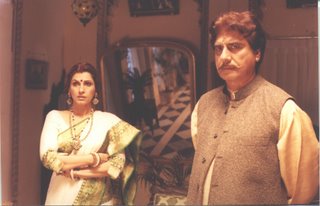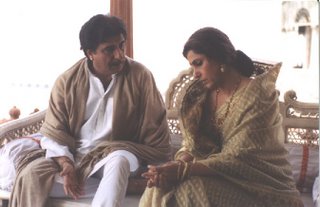"Soham must die": Gayatri Devi... contd...
Gayatri Devi was obviously born in royalty. She was possibly the pampered child of the rich and aristocratic parents. Being a girl child, she would, however, have obtained up to only a middle level education available in the local town even though she would be a brilliant scholar. She would have cried for higher education, as the parents would have denied her sending to city in the fear of risking the honor of the family.

When parents would have found Mahendranath, the rich, well educated and honorable boy of the Mahanth’s son of Banaras, they must have considered their daughter extremely lucky. She would, no doubt, have brought huge wealth as dowry that would have given her a huge stature and social power in the city of Banaras. Mahendranath too, must have considered himself lucky having gotten a wife who was beautiful, intelligent and regal.
Time passed and the worries grew, as the couple didn’t conceive a child. They went to temples, worshipped the Gods and visited Godmen. When they had lost complete hope of a child, lord Shiva blessed them with the beautiful Shwetambari. She became the pupil of their eyes. They would both do anything to see their blessed child happy.
Shwetambari would remember how her mother would take her to temples and how people would bow in front of her very proud mother. She would always be in awe of her. She respected her mother immensely but grew closer to her gentle father, Mahendranath, who was much more liberal, tolerant and philosophical.
Shwetambari was an exceptionally bright child and got easily admitted to the local university. Since she didn’t have to leave the house, Gayatri Devi, though not entirely happy, allowed Shwetambari to continue studies. Gayatri Devi would have been happier if her daughter would have just learnt music, embroidery and cooking and been married early to a nice Brahmin boy.
When Shwetambari begins to take interest in music, Gayatri Devi becomes hopeful. She assumes the music teacher to be an old man and therefore never saw any risk in Shwetambari leaning music from him. However when she sees Soham on the holi day, she gets terribly upset. When she tries to talk to Mahendranath, he asks her to take things lightly. However, Gayatri, since alerted, must have discussed her doubts with Mahamaya.
Mahamaya loved Shwetambari as her real sister and felt extremely protective towards her. Therefore, no sooner than he hears of her being seen with Soham in Sarnath, that he comes to report to Gayatri and Mahendranathj
Things take a serious turn after the parents confront their daughter.
Imagine the state of Gayatri. She would have demanded Mahendranath to stop Shwetambari’s education and get her married immediately. Mahendranath would have promised that he would be able to talk Shwetambari out of this. Mahendranath’s words must have sounded hollow to Gayatri, as he knew her daughter better. She also knew the limits to which a “liberal” Mahendranath would go to sort things out, therefore she isolates herself and begins to prepare an alternative and independent plan to “protect” her “ignorant” child from the “evils” of Soham.
From this point onward she plays along with Mahendranath but begins pursuing her own path. She would not depend upon Mahamaya for the task because even though he was devoted to her, Mahamaya was in awe of Mahendranath. He would have never done a crime behind his back. After all Mahamaya knew that he was able to bend rules here and there to make a living only because of the mercies of Mahendranath.
On the other hand, Sevak Ram was much more devoted to her. She was a royal and she knew how to keep her servants loyal to her. Sevak Ram would do anything to protect the honor of the family. When she would have told Sevak Ram to get rid of the “ambitious monkey” who was trying to bring dishonor to the family, he would have felt duty bound to accomplish the task.
After the murder of Soham, Gayatri is nervous, not repentant. Nervous, not because “she” has done anything wrong but because she had not anticipated Shwetambari’s reaction to his death. She is nervous about the state of her daughter. Go and watch the movie again, she fiddles with her Sarees, looks here and there but never repentant. In fact we never had to try to shield her guilt to keep the suspense alive because she never had any guilt. Guilt would normally be associated with a murder done in a rage. The murder of Soham was done in cold blood. There was no wavering. It was a completely “rational” in the mind of Gayatri Devi.
Remember, the scene where Shwetambari overhears the parents talking about the plot of applying pressure on Soham to say “no” to the marriage, and Gayatri saying, innocently, ”What else could have we done? Could we have given our daughter to a sweeper?”

This statement summarizes the character of Gayatri. There is no malice in it. It is stated as a mere a necessity.
In Gayatri’s mind, she committed NO crime. What she did was merely to protect her daughter from the evil designs of Soham. Soham could not be allowed to be in love with Shwetambari. He had no right to be. Soham could not be allowed to live. He had to die.









